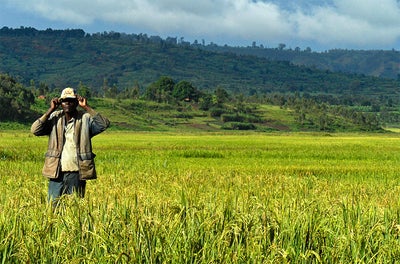 For those keeping abreast of Burundi’s state of affairs, it could be easy to forget that the country is much more inviting than what we have seen lately in the media. Despite the ongoing crisis, Burundians have kept an uphill battle to reinforce the conservation and management of the nation’s forest areas.
For those keeping abreast of Burundi’s state of affairs, it could be easy to forget that the country is much more inviting than what we have seen lately in the media. Despite the ongoing crisis, Burundians have kept an uphill battle to reinforce the conservation and management of the nation’s forest areas.
It has been a decade since Burundi began its peacebuilding efforts from a twelve-year-long civil war which killed 300,000 people. After an attempted coup d’état on May 15, tensions in the country made another tug at international headlines, with over 100,000 Burundian refugees in neighboring countries, according to the United Nations.
Just a few days after the coup, Burundi celebrated its conservation efforts on May 22, the International Day of Biodiversity. The events promoted the need to preserve biodiversity and to use sustainable land practices. Government officials, environmental clubs, and residents alike gathered to commemorate through song, dance and other traditional festivities.
The global theme, "Biodiversity for Sustainable Development", was particularly appropriate, considering the country’s advances with managing the Bururi Natural Forest Reserve (BNFR). BNFR is part of the $4.2 million GEF-sponsored Sustainable Coffee Landscape Project (PADZOC), which has shown promising results in enabling Burundi’s coffee farmers to become more resilient and biodiversity-friendly.
The project promotes shade-grown coffee that provides the multiple wins of increased productivity, more nutrients for the soil, more fuelwood, more revenue and ultimately more resilient landscapes and people. These solutions are especially useful as land degradation has aggravated already high levels of poverty, food insecurity, disaster risk management and conflict over scarce land.
For Leonidas Nzigiyimpa, coordinator of the project, the event was about hope for the future and hope for preserving the environment without which there will be no future.
With 90% of the country’s population depending on subsistence agriculture for employment, preserving land resources also translates into job security for many Burundians. Lately, much effort was put into learning what others are doing to manage their natural assets. A South-South Knowledge Exchange on coffee landscapes with Colombia, Ethiopia, and Rwanda provided some answers. It allowed Burundians to sharpen their skills on combining coffee with trees and other crops to improve the productivity and health of coffee landscapes.
Though the latest coverage on the country may not highlight it, the efforts to promote more sustainable land use practices and conservation-compatible livelihoods have not been neglected by Burundians during these difficult moments.
Burundians are forging ahead to create better welfare and livelihoods for themselves and future generations. As Rachidi Radji, World Bank Country Manager for Burundi, said this is indeed refreshing news.


Join the Conversation